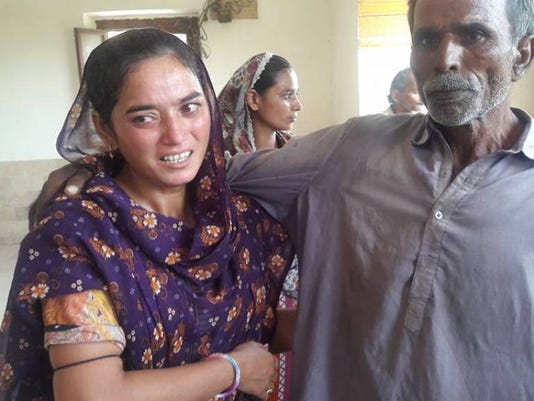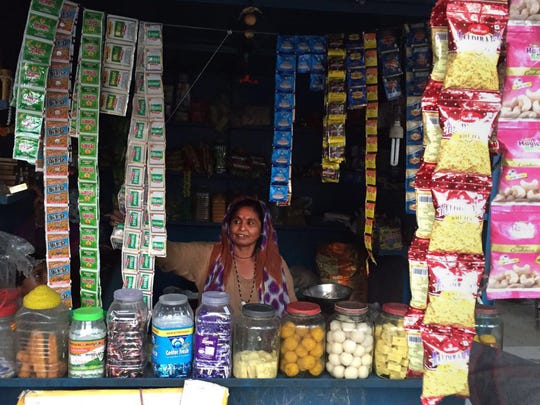Naila Inayat
 The police refused to intervene. Her kidnapper told them she ran away from home, and converted to Islam and married him voluntarily. But after her family pressured a court to intervene, she told judges the truth and they freed her.
The police refused to intervene. Her kidnapper told them she ran away from home, and converted to Islam and married him voluntarily. But after her family pressured a court to intervene, she told judges the truth and they freed her.
“Her life was threatened,” her attorney, Ramesh Gupta, said. “She wanted to go back to her parents and the statement (she made to the court) helped to sway the decision in her favor and she was freed to join her family.”
Meera Bai, a Pakistani Hindu immigrant in New Delhi, says "Muslims in Pakistan will never treat Hindus as their own." (Photo: Naila Inayat)
Anila is one of many Pakistani Hindu girls kidnapped because of religious discrimination in a country that is 98% Muslim.
 Every year, Muslim men abduct and forcibly convert about 1,000 girls — mostly Hindus, but also Christians, according to the South Asia Partnership-Pakistan, a local human rights group. About 5,000 Pakistani Hindus leave every year for neighboring India — where 80% are Hindus — to escape religious persecution, according to the Pakistan Hindu Council.
Every year, Muslim men abduct and forcibly convert about 1,000 girls — mostly Hindus, but also Christians, according to the South Asia Partnership-Pakistan, a local human rights group. About 5,000 Pakistani Hindus leave every year for neighboring India — where 80% are Hindus — to escape religious persecution, according to the Pakistan Hindu Council.
Legislation banning such conversions for those under age 18 was passed unanimously late last year by the legislature in the southern province of Sindh, where the Kohlis live, but it never went into effect.
Hard-line Islamic groups objected to the measure, which called for up to five years in jail for those who force a conversion. They threatened protests, arguing the law was anti-Islamic and part of a conspiracy to make Pakistan a secular country.
"We will not remain silent on this controversial law," said Hafiz Saeed, a leader of the Jamaat-ud-Dawa, a self-described charity that the United States has labeled a terrorist group.
The measure was vetoed in January by Sindh Gov. Saeed-uz-Zaman Siddiqui, who died a few days later. The legislative defeat was a major setback for human rights in Pakistan, activists say.
“The problem of conversions is real,” said Ramesh Kumar Vankwani, a mewmber of the Pakistan Hindu Council and parliament. “We are not against the conversion of religion as a result of research or preaching. But why are only underage Hindu girls in Sindh changing religion?”
For example, Ameri Kashi Kohli’s 14-year-old daughter was abducted from her home in southern Pakistan one night last summer as she slept.
The Hindu farm worker was aghast when she discovered what actually happened to her daughter soon after. “She had been converted to Islam and became the second wife of our landlord,” Kohli said. Her landlord falsely claimed the teen was compensation for a $1,000 debt the family owed him.
Making it even worse, the police refused to help. "They just said forget your daughter, she has converted," Kohle explained. They said "my daughter Jeevti is now known as Fatima."
Some say the defeat of the bill shows definitively that religious hardliners have too much power in the country.
“Government after government, military and civilian, have caved in to pressure from the extremists,” said Farahnaz Ispahani, a fellow at the Woodrow Wilson International Center for Scholars in Washington, D.C., who specializes in Pakistan’s minorities. “It is imperative for the government to stand by the people it represents. The bill to stop enforced conversion must be passed unaltered.”
She said Muslim leaders oppose extending new protections to Pakistanis who belong to religious minorities, especially women.
“Muslims in Pakistan will never treat Hindus as their own,” said Meera Bai, a Pakistani Hindu immigrant in New Delhi. “For them, we will always remain the ‘other.’"
"We escaped religious and cultural persecution when we came to India," she added. "We are happy here. At least here we know that no one will steal our cattle or our young daughters.”
As for Kohli, she says her daughter is lost. Soon after the abduction, the landlord produced an affidavit from the teen stating she purposefully ran away, converted and married, something her parents say she was forced to write. She's not allowed to meet with her family or friends, according to her husband's rules.
Kohli said her daughter's plight underscores the uncertain future that Hindus face in Pakistan.
"There (are) many Fatimas in this country," Kohli said. "But does this country have place for a Jeevti?”
No comments:
Post a Comment